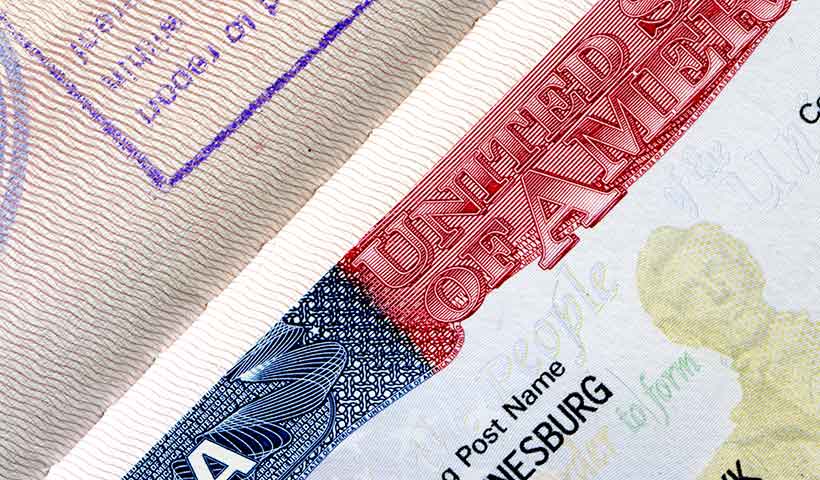Beginning the process of obtaining a US Spouse Visa, particularly the K-3 Visa, involves a series of distinct steps and requirements. This visa is specifically made for Thai nationals married to US citizens, aiming to reunite them in the United States. Understanding this type of visa involves more than just managing documents; it’s about bringing families together from different countries.
The K-3 Visa, a category of non-immigrant visas, permits the Thai spouse of a US citizen to enter the United States while their immigrant visa petition is under review. It serves as a temporary measure intended to reduce the time couples spend apart. In a realm where legal procedures can often be lengthy and convoluted, the K-3 Visa emerges as a ray of hope for couples eager to commence their shared life in the US.
Through this article, we will guide you through the key aspects of the US Spouse Visa, presenting a clear, concise, and easy-to-follow outline to aid your understanding of this process. Covering everything from the criteria for qualification to the application steps, timing, and legal assistance, our goal is to offer a direct and simple route to family reunification. Let’s explore the K-3 Visa and its role in bridging distances and uniting families.
Understanding the K-3 Visa
The K-3 Visa stands as a special category of visa designed for the Thai spouses of US citizens. Its primary purpose is to shorten the physical separation between the couple during the immigration process. This visa differs from other spouse-related visas like the CR-1 and IR-1 visas, which are immigrant visas leading to permanent residency.
The K-3 is classified as a non-immigrant visa, allowing the Thai spouse to reside in the United States with their US citizen spouse while awaiting the adjudication of their immigrant visa petition. It’s a temporary yet effective solution for couples who wish to start their lives together in the US without enduring prolonged separation.
Understanding this distinction is key in choosing the right visa for your situation. While the K-3 Visa provides a quicker route for couples to be together in the US, it does not directly grant permanent residency. Once in the US, the Thai spouse will need to adjust their status to become a permanent resident, a process that involves additional steps and applications.
The choice between a K-3 and other spouse visas depends on various factors, including the couple’s circumstances, their long-term plans, and how quickly they wish to be reunited. Each visa type has its unique procedures, processing times, and implications for the couple’s future in the US.
Eligibility Criteria
For a successful K-3 Visa application, both the US citizen and the Thai spouse must meet specific requirements. These criteria are in place to ensure the legitimacy of the marriage and the intentions of the applicants.
For the US Citizen:
- Legal Marriage: The US citizen must be legally married to a Thai national. This involves having a valid marriage certificate.
- Petition Filing: The US citizen must file a Petition for Alien Relative (Form I-130) on behalf of their Thai spouse. This form demonstrates the marital relationship to the United States Citizenship and Immigration Services (USCIS).
For the Thai Spouse:
- Marriage to a US Citizen: The primary eligibility requirement for the Thai spouse is being legally married to a US citizen.
- Proof of Relationship: Applicants must provide evidence of their marriage and ongoing relationship. This might include photographs, correspondence, joint financial statements, and other documents that prove the authenticity of the marriage.
- Medical Examination: The Thai spouse must undergo a medical examination by an approved physician.
- Police Clearance: A police clearance certificate is required to show that the Thai spouse has no criminal record.
Legal Considerations:
- The marriage must be valid in Thailand and the United States. Couples should know the legal requirements for a valid marriage in both countries.
- If either party has been previously married, they must provide proof of the legal termination of previous marriages, such as divorce decrees or death certificates.
Meeting these criteria is the first step in the K-3 Visa application process. Once these requirements are satisfied, the couple can proceed with the application process, which involves gathering documentation and submitting forms to both the USCIS and the US Embassy in Bangkok.
Application Process
The process for applying for a K-3 Visa involves several steps, each crucial for a successful application. Here is a step-by-step guide to navigating this process:
- Filing the Petitions:
- The US citizen spouse starts by filing Form I-130 (Petition for Alien Relative) with the United States Citizenship and Immigration Services (USCIS). This form establishes the marital relationship.
- After receiving the I-130 receipt notice from the USCIS, the US citizen then files Form I-129F (Petition for Alien Fiancé(e)), specifically for the K-3 Visa. This petition requests permission for the Thai spouse to enter the US temporarily.
- National Visa Center (NVC) Processing:
- Once the USCIS approves the I-129F petition, it is sent to the National Visa Center. The NVC processes the petition and sends it to the US Embassy in Bangkok.
- Preparing for the Interview:
- The Thai spouse must gather the required documents, including marriage certificates, police clearance, medical examination results, and evidence of the relationship.
- The Thai spouse will also need to complete a visa application form and prepare for a visa interview.
- Visa Interview:
- The Thai spouse attends an interview at the US Embassy in Bangkok. During the interview, a consular officer evaluates the application and determines the eligibility for the K-3 Visa.
- It’s crucial to answer all questions truthfully and provide complete and accurate documentation.
- Visa Issuance:
- If the application is approved, the K-3 Visa is issued, allowing the Thai spouse to travel to the United States.
- Travel to the US:
- Upon arrival in the US, the Thai spouse will be admitted as a K-3 nonimmigrant.
- The couple then must start the process for adjusting the Thai spouse’s status to a permanent resident.
This process can be daunting, but with careful preparation and attention to detail, it can be managed smoothly. Each step requires thorough documentation and adherence to legal procedures. In the next section, we will discuss the timeline and processing times for the K-3 Visa, giving you an idea of how long you might expect to wait.
Timeline and Processing Times
The timeline for obtaining a K-3 Visa can vary significantly based on several factors, including the workload at USCIS, the National Visa Center (NVC), and the US Embassy in Bangkok. Understanding these timelines is crucial for couples planning their future.
- Initial Petition Processing (USCIS):
- The processing time for the I-130 Petition for Alien Relative can vary. Generally, it takes several months for the USCIS to process this petition.
- After the I-130 is filed, the US citizen can file the I-129F petition. The processing time for the I-129F is also subject to the USCIS’s current workload.
- NVC to Embassy Transfer:
- Once the I-129F petition is approved, it is forwarded to the NVC. The NVC processes the petition and then sends it to the US Embassy in Bangkok. This process can take a few weeks to a couple of months.
- Embassy Processing:
- After receiving the petition, the US Embassy in Bangkok will schedule an interview with the Thai spouse. The wait time for an interview can vary, but typically it takes a few weeks to a few months.
- Preparing for the interview, including gathering required documents and completing medical examinations, also adds to the timeline.
- Post-Interview Processing:
- If the visa is approved during the interview, there may still be a short processing time before the visa is physically issued. This period can range from a few days to a few weeks.
Factors Affecting the Timeline
- Incomplete or incorrect application materials can cause delays.
- External factors such as holidays, changes in immigration law, or global events can also impact processing times.
Applicants need to be prepared for these varying time frames and plan accordingly. Patience and careful preparation during each step can help mitigate stress during the waiting periods.
Advantages of the K-3 Visa
The K-3 Visa offers specific benefits that make it an attractive option for couples where one partner is a Thai national and the other a US citizen. Understanding these advantages can help couples decide if this is the right path for their situation.
- Reduced Separation Time:
- The primary advantage of the K-3 Visa is its potential to reduce the time spouses spend apart. Since it allows the Thai spouse to enter the US while waiting for the immigrant visa petition to be processed, couples can be together sooner compared to waiting for the processing of an immigrant visa like the CR-1 or IR-1.
- Ability to Adjust Status in the US:
- Once in the United States, the Thai spouse on a K-3 Visa can file to adjust their status to that of a lawful permanent resident. This process, while requiring additional steps, allows the couple to start their life together in the US while handling these legal requirements.
- Employment Authorization:
- K-3 visa holders are eligible to apply for employment authorization upon arrival in the US. This permits the Thai spouse to work and contribute financially while awaiting the adjustment of status.
- Flexibility in Travel:
- The K-3 Visa allows for travel outside of the US and re-entry, provided the visa remains valid. This flexibility can be important for couples needing to manage affairs in both countries.
- Access to US Systems:
- Being in the US on a K-3 Visa allows the Thai spouse to start adapting to life in the United States, including understanding its systems, culture, and environment, which can be beneficial for the eventual transition to permanent residency.
While the K-3 Visa offers these advantages, it’s also important to consider its temporary nature and the requirement to adjust status after arrival in the US. Couples should weigh these benefits against their personal circumstances and long-term plans.
Costs and Fees
Understanding the financial aspect of applying for a K-3 Visa is crucial for couples planning this journey. The process involves various fees and potential additional costs that need to be considered.
- USCIS Filing Fees:
- The Petition for Alien Relative (Form I-130) and the Petition for Alien Fiancé(e) (Form I-129F) both require filing fees. These fees are set by the USCIS and are subject to change, so it’s important to check the current rates on the USCIS website.
- Medical Examination and Police Clearance:
- The Thai spouse needs to undergo a medical examination by an approved physician. The cost of this examination varies depending on the medical facility.
- A police clearance certificate is also required, which may involve a nominal fee.
- Visa Application Fee:
- There is a fee for the K-3 visa application, payable at the time of applying to the US Embassy or Consulate.
- Travel and Miscellaneous Expenses:
- Couples should account for travel expenses, including the cost of the Thai spouse traveling to the US Embassy for the interview and eventually to the United States.
- Additional expenses might include costs for obtaining necessary documents, postage, and translation services if required.
-
- Adjustment of Status Fees:
Once in the United States, the Thai spouse will need to adjust their status to a permanent resident, which involves additional fees.
Common Challenges and Solutions
Applying for a K-3 Visa can present several challenges, but being aware of these and knowing how to address them can significantly streamline the process. Here are some common issues and practical solutions:
- Document Preparation:
- Challenge: Gathering and preparing all the necessary documents can be overwhelming. Missing or incorrect documents can lead to delays.
- Solution: Create a checklist of required documents and start collecting them early. Double-check for accuracy and completeness. Legal assistance can also help in ensuring that all documentation meets the required standards.
- Lengthy Processing Times:
- Challenge: The processing times for visas can be lengthy and unpredictable.
- Solution: Plan in advance and apply as early as possible. Stay informed about current processing times and be prepared for waiting periods. Patience is key.
- Visa Interview:
- Challenge: The visa interview can be daunting, and applicants might be nervous or unsure about how to answer questions.
- Solution: Prepare thoroughly for the interview. Understand the types of questions that might be asked and rehearse your responses. Remember, honesty and clarity are crucial.
- Changes in Circumstances:
- Challenge: Changes in personal circumstances, such as employment, address, or family status, can affect the visa application.
- Solution: Inform the USCIS and the US Embassy of any significant changes as soon as possible. Keep all records up to date.
- Legal Complexities:
- Challenge: The legal aspects of the visa process can be complex and hard to navigate.
- Solution: Consider hiring a legal professional who specializes in US immigration law. This can provide clarity and guidance, reducing the risk of errors and oversights.
By anticipating these challenges and preparing for them, applicants can enhance their chances of a smooth and successful K-3 Visa application process.
Contact Siam Legal
Applying for a K-3 Visa is complex, requiring detailed documentation and legal understanding. Professional legal help, like that from Siam Legal, offers beneficial benefits:
- Expert Guidance
Legal experts provide current information, assist in filling out forms, collect necessary documents, and meet legal requirements. - Handling Complications
They offer solutions for unique issues such as past visa denials or proving marriage legitimacy. - Interview Preparation
Advisors prepare applicants for interview questions and presentations to consular officers. - Time and Stress Reduction
Legal professionals manage the application process, saving time and reducing stress. - Post-Arrival Support
After arrival in the US, legal assistance continues, helping with the status adjustment to permanent resident.
While applying for the application yourself is possible, the expertise of a legal team greatly enhances the likelihood of a successful visa application.
 | Ken Graham US Immigration Attorney Partner, Siam Legal International |
 | Natdaphon Luengsawang Senior US Visa Consultant Siam Legal International |
LIVE SUPPORT
 CALLCall (702) 799 9719 |  CHATChat with our representative | |
| From US: Sunday – Friday 5:00 PM – 7:00 AM (New York time) 2:00 PM – 4:00 AM (Los Angeles time) From Thailand: Monday – Friday | ||








































